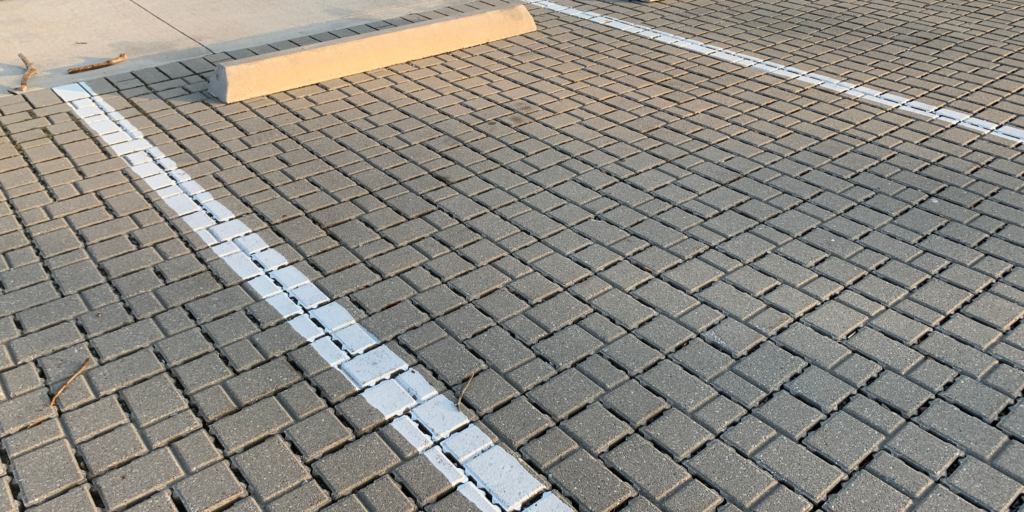Hi, property managers! Parking lot care is often disregarded in property management but may make a big difference. You heard right! A well-kept parking lot improves your property’s appeal and saves you time and money.
You may be asking which parking lot material is the finest. Asphalt will save the day! Asphalt parking lots can change the game for property managers like you due to their many advantages.
We’ll explain how asphalt saves time and money. We’ll also discuss why preventive maintenance is essential to long-term savings.
The benefits of choosing asphalt over other materials for a parking lot
Property managers have many parking lot material alternatives. Asphalt is notable for its many benefits. Asphalt has advantages over gravel.
Durability is a major virtue of asphalt. Despite heavy traffic and harsh weather, asphalt may last. This reduces long-term repair and maintenance expenditures.

Asphalt makes vehicle surfaces smooth. Asphalt is smooth and comfortable for drivers and passengers, unlike gravel.
Water drains well in asphalt. Instead of accumulating, moisture seeps through its porous nature. This prevents rain-related slips.
Asphalt parking lots are also faster to install than other ones. Layers of hot mix asphalt are laid down during installation, ready for use within hours or days depending on project size.
Time-saving advantages of asphalt parking lots
Installing an asphalt parking lot saves property managers time. Asphalt installs quickly, allowing property managers to have a fully functional parking lot faster than other materials.
Its short drying time makes asphalt installation faster than other materials. Asphalt pavement can be used immediately after being placed and compacted. This reduces property downtime and tenant/customer interruption.
Asphalt parking lots require less care than others. Crack sealing and sealcoating can be done swiftly and efficiently, keeping your parking lot in good shape.
Asphalt enables spot repairs instead of section replacement. It saves time and money to repair only the problematic regions rather than the entire surface.
Winter snow removal is more efficient on asphalt parking lots due to their smooth surface. Snowplows can readily remove snow from flat surfaces without damaging pavement.
Property managers can save time from installation to maintenance by choosing an asphalt parking lot, allowing them to focus on other vital areas of property management.
Cost-effective benefits of asphalt parking lots
Property management usually prioritizes cost-efficiency. Asphalt parking lots have many long-term financial benefits for property managers.
Asphalt is cheaper than gravel. The initial installation and ongoing maintenance expenditures are lower. Asphalt parking lots survive longer and handle considerable traffic without damage.
Asphalt parking lots are easy and cheap to maintain. Simple crack sealing and sealcoating can prevent further damage and extend pavement life. Proactive maintenance helps property managers prevent costly damage.
Parking lot vehicles use less gasoline due to asphalt’s flat surface. The smoother ride improves fuel economy for renters’ cars and on-site service vehicles. This cuts gasoline costs and carbon emissions, helping the environment.
Asphalt parking lots look better and attract more customers. A clean parking lot makes a good first impression and keeps people safe.
How proactive maintenance can save property managers time and money in the long run
Asphalt parking lot upkeep should be proactive to save property management time and money. Property managers can avoid major concerns by addressing issues early.
Regular inspections and upkeep can spot cracks and potholes before they become costly repairs. Sealcoating asphalt parking lots every few years can increase their lifespan and reduce the need for costly resurfacing or renovation.
Proactive maintenance reduces downtime and repair costs. Property managers realize that a clean parking lot attracts tenants and consumers. Parking lots with construction impediments are the last thing anyone wants.
Property managers can keep asphalt parking lots safe, practical, and attractive by maintaining them regularly. This lets them concentrate on other property management tasks rather than parking lot issues.
Preventative maintenance saves property managers money and gives them piece of mind that their asphalt parking lots will continue to serve them well for years. Don’t delay—act now!
Case studies or examples of successful installations and cost savings
Case studies of successful installations and cost reductions show property managers the benefits of asphalt parking lots. An asphalt parking lot was installed at a downtown commercial site that replaced its broken. Quick and effective installation minimized tenant and visitor interruption.
The new asphalt parking lot improved the property’s attractiveness and saved the property manager money. Asphalt is easier to maintain than gravel. This reduces future repairs, repairing, and resurfacing.
With their newly built asphalt parking lot, this property management saved money on long-term upkeep and reduced liability risks owing to better safety measures. The smooth surface improved vehicle traction in bad weather and minimized pedestrian tripping hazards.
Another case study was a residential complex that transitioned from gravel to asphalt parking. Dust in residents’ homes and shared areas plummeted. This significantly improved air quality and reduced resident and management cleaning expenditures.
These examples show how asphalt parking lots can save money over time while increasing utility and beauty. Property managers can save money and enjoy years of excellence by investing in high-quality materials and competent installation.
Other factors to consider when installing an asphalt parking lot
Property managers must consider other aspects while installing an asphalt parking lot. Consider the environment and weather where the parking lot will be placed. Asphalt thrives in mild regions with few freeze-thaw cycles.
Good drainage is another consideration. A sloped asphalt parking lot directs water to drains or outlets. This prevents water buildup and surface damage.

When designing an asphalt parking lot, property managers should consider traffic and load-bearing capability. Heavy vehicles like trucks and delivery vans may need thicker asphalt or reinforcement.
Installation requires a reputable contractor. Find skilled workers who employ high-quality products and industry standards. Asphalt parking lots need ongoing upkeep to last. Regular sealcoating, crack sealing, and pothole repairs can prevent costly damage.
These things will help your asphalt parking lot install and last!
Conclusion – highlighting the overall benefits and value
Property managers can save time and money by installing asphalt parking lots. Choosing asphalt over other materials gives property managers durability, longevity, and little upkeep.
Asphalt parking lots save time. Property managers can prioritize other activities with fast installation and little downtime for maintenance or resurfacing. Asphalt’s smooth surface eliminates debris and makes winter snow removal easy.
Asphalt is cost-effective too. It costs less to install than pavers. Properly maintained asphalt lasts longer, reducing repair and replacement costs.
Maximizing these benefits and avoiding costly complications requires regular maintenance. Regular inspections and sealcoating avoid cracks and potholes and extend parking lot life. Property managers should also fix the damage quickly to avoid costly repairs.
Real-life case studies show how asphalt parking lots save property managers time and money. Because asphalt requires less dust management, a shopping complex cuts maintenance hours after moving from gravel to asphalt. Another case study revealed that installing correct drainage systems prevented water damage that could have cost significant repairs.

